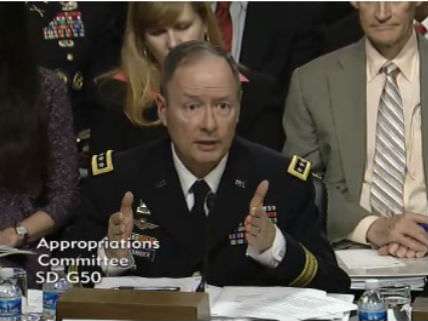How Many Attacks Would Have Happened Without the NSA's Phone Record Database? Possibly Zero.

At a Senate Appropriations Committee hearing yesterday, Sen. Patrick Leahy (D-Vt.) asked Gen. Keith Alexander, director of the National Security Agency, if "the intelligence community [has] kept track of how many times phone records obtained through Section 215 of the PATRIOT Act were critical to the discovery and disruption of terrorist threats." Alexander chose to answer a different question, saying the phone records "have helped prevent…dozens of terrorist events…both here and abroad." Saying the NSA's massive database of phone records was helpful is not the same as saying it was necessary, especially since the government could follow up on specific leads by applying for orders seeking relevant information, rather than using blanket orders to collect records for millions of innocent people just in case they might be useful one day. Later in the hearing, Alexander retreated further from any claim that the phone record database has been "critical" (as Leahy put it) in disrupting terrorism:
When I say "dozens," what I'm talking about here is that these authorities [Section 215 of the PATRIOT Act and Section 702 of the Foreign Intelligence Surveillance Act, which authorizes the NSA to monitor online activity, with the official targets limited to foreigners in other countries] complement each other in helping us identify different terrorist actions and helping disrupt them. They complement each other. So what you're asking me is to state unequivocally that A or B contributed solely to that. The reality is, they work together.
In other words, Alexander is not willing to say that the NSA's enormous phone record grab has been crucial in preventing a single terrorist attack, or whether less sweeping, investigation-specific data demands would have been equally effective.
But why bother being more selective? Writing in the Chicago Tribune, two leading libertarian legal scholars, the Cato Institute's Roger Pilon and NYU law professor Richard Epstein, argue that the NSA's data dragnet—which apparently includes location information as well as the numbers people call, the numbers from which they receive calls, the timing of the calls, and the lengths of the conversations—represents only a "trivial" intrusion on privacy:
The government does not know—as some have charged—whether you've called your psychiatrist, lawyer or lover. The names linked to the phone numbers are not available to the government before a court grants a warrant on proof of probable cause, just as the Fourth Amendment requires.
Even assuming that procedure is actually followed (and how would we know if it isn't?), the names and addresses associated with phone numbers are generally a matter of public record. Interactions among numbers, which are included in the records that the NSA obtains through Section 215 orders, are not. But once you have the latter, it is easy enough to figure out what they signify about someone's heretofore private affairs. No warrant is required.
Pilon and Epstein concede there is potential for abuse of this information but say that is not enough to justify tighter controls on government access to it:
Yes, government officials might conceivably misuse some of the trillions of bits of metadata they examine using sophisticated algorithms. But one abuse is no pattern of abuses. And even one abuse is not likely to happen given the safeguards in place. The cumulative weight of the evidence attests to the soundness of the program. The critics would be more credible if they could identify a pattern of government abuses.
I don't know about you, but until last week I did not even know the NSA kept a comprehensive database of our phone records. Isn't it possible that abuses of this heretofore secret program have been kept under wraps as well? As people who try to challenge government snooping in court have discovered, it is pretty hard to prove that you have been subjected to clandestine surveillance. And since when do we insist on evidence that a threat to liberty has already materialized before supporting safeguards aimed at preventing it?
You can watch yesterday's hearing here.


Show Comments (35)